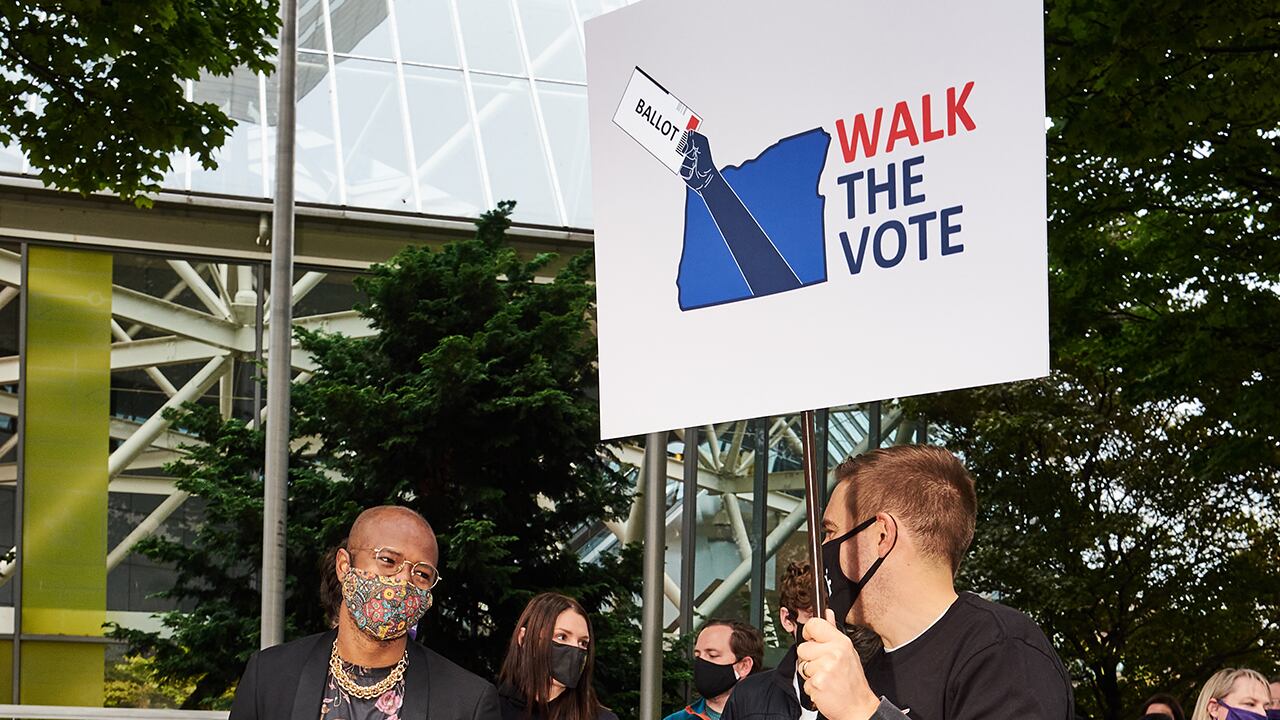In a setback for election reformers, the Oregon Supreme Court in a unanimous opinion declined to direct Secretary of State Shemia Fagan to reverse a decision to disqualify ballot measures aimed at limiting campaign contributions in Oregon.
Fagan disqualified the measures in February, arguing that they did not contain the full text of the laws they would change, as required by the Oregon Constitution. Honest Elections Oregon had asked the state’s highest court to direct Fagan to reverse that decision, as well as for an expedited briefing schedule on the matter, arguing that any delay caused by litigation would keep the measures off the November ballot.
Today, the court denied the request to direct Fagan to reverse her decision. “This is not a case in which exceptional circumstances persuade us that the issue that relators raise is so novel and significant, and that immediate resolution is so imperative, that we should exercise our discretionary mandamus jurisdiction on an expedited basis,” the court wrote.
The court said Honest Elections should have started the process earlier.
“Relators could have begun the initiative process earlier, so that, if the secretary identified deficiencies, relators could have taken timely steps to contest or cure them within the same election cycle,” the court wrote.
“Relator” is a legal term for a person seeking a writ of mandamus, which is an order from a court to a government official to fulfill a duty or correct an abuse.
Jason Kafoury, one of the founders of Honest Elections Oregon, said he was disappointed with the court’s decision. As a result, it will be hard to get the ballot measures on this year’s ballot.
“It’s a sad result for Oregonians who want to get big money out of politics,” Kafoury said.
The Oregon Supreme Court gave Honest Elections until March 22 to ask the court to reconsider, a move that Honest Elections is considering, Kafoury said.
Fagan issued a statement shortly after the ruling.
“I am one of the millions of Oregonians eager to see speedy, meaningful progress on campaign finance reform,” Fagan said. “Whether by legislators or through the public initiative process, making law takes time, and the constitution sets the rule of law. There are no shortcuts.
“I appreciate the court’s work on this matter, including its clear statement about timeliness,” she added. “As the court noted, all initiative petitioners should file early, to allow time to fix constitutional errors and to avoid the ‘substantially negative impact [of] rushed, last-minute reviews’ by the Supreme Court.”
Fagan and Honest Elections Oregon had been dueling over the ballot measures since early February, when a lawyer in Fagan’s office informed Kafoury that her rejection was coming, a phone call first reported by WW.
Kafoury accused Fagan of thwarting the measure because it would limit contributions by labor unions that contributed millions to her 2020 campaign. That haul helped her bury her opponents despite a late entry into the race. “It smells like selective enforcement to me, and it reeks of political cronyism,” Kafoury said in February.
Fagan fired back days later, saying the Honest Elections team was falsely maligning her integrity.
“There are two pieces of misinformation spreading about these measures that are easily debunked,” Fagan said on Feb. 9. “First, petitioners of the current measures have falsely labeled this decision as biased. That is false. Second, petitioners have falsely suggested that under recent secretaries, ballot measures became law without meeting the constitution’s full text rule. My team reviewed each of the laws they cited, and all of them met the full text rule.”
Fagan said she was a “consistent supporter of campaign finance reform” and that she was “disappointed” to reject the petitions from Honest Elections Oregon. “As a senator in 2019, I voted for the constitutional amendment to allow campaign finance limits. I then championed the measure while running for secretary of state.”
Measure 107 was a precursor to the Honest Elections initiatives. Referred to voters by the Oregon Legislature, it gave lawmakers and local governments the authority to limit political donations and to require disclosure of the names of contributors.
The measure showed that Oregonians are eager to reform campaign finance in Oregon, one of just five states with no limits on political contributions. It passed 78.3% to 21.7%.
Honest Elections Oregon spearheaded campaign limits in the city of Portland and Multnomah County. This year’s elections will apply those limits for the first time. They prohibit contributions of more than $500 per donor in county races and $508 in city races.
Today’s decision is the second elections-related victory for Fagan before the Supreme Court. Last month, the court agreed with Fagan’s decision to block New York Times columnist Nicholas Kristof’s bid for governor, saying that he hadn’t been a resident of the state for three years, as required by Oregon law.
Unless Honest Elections can persuade the court it erred, the group must now proceed to Marion County Circuit Court for consideration of the merits of its arguments.

